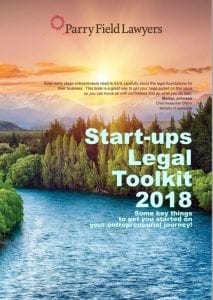When setting up a company, there are lots of new roles to get your head around. Whether you are a shareholder yourself, or a director in a company, it is important to understand what is expected from the role.
Generally, the constitution of a company determines the rules for how the company is to run. The Companies Act 1993 (“the Act”) often sets out that a company can only do certain things if its constitution allows it. In New Zealand however, a company is not required to have a constitution. Although it is very useful to have, it is not a legal requirement. In the absence of one, the Act sets out the rights, duties and obligations of shareholders, amongst other matters.
Shareholders’ Powers
Although shareholders are not responsible for, and don’t participate in, the day-to-day management of the company, the Act holds that there are certain powers that only shareholders of a company can exercise. These include:
- Adopting, altering or revoking a constitution (section 32);
- Altering shareholder rights (section 119);
- Approving a major financial transaction (section 129);
- Appointing and removing directors (sections 153 and 156);
- Approving an amalgamation (section 221); and
- Putting the company into liquidation (section 241).
While the appointing and removing of directors is usually done by an ordinary shareholders’ resolution (simple majority vote), the other powers require a shareholders’ resolution to be passed by a majority of 75% (or higher if required by the company’s constitution) of those shareholders entitled to vote, and voting on the decision.
Under section 109 of the Act, shareholders may also question and pass a resolution relating to the management of the company. However unless the constitution says otherwise, the resolution is not binding on the board.
Limitations
Shareholders can bring an action against a director for a breach of duty owed to them, but not all directors’ duties are owed to shareholders. Section 169(2) makes it clear that a shareholder cannot bring an action against a director for any loss in the value of their shares by reason only of the loss being suffered by the company.
Reporting Requirements
Under section 178, a shareholder may, at any time, make a written request to a company for information held by the company. The company then has 10 working days from receiving the request to:
- provide the information; or
- agree to provide the information within a specific period; or
- agree to provide the information within a specified period if the shareholder pays a reasonable charge to the company to meet the cost of providing the information; or
- refuse to provide the information specifying the reasons for refusal.
The company may refuse if:
- disclosure would or would be likely to prejudice the commercial position of the company; or
- disclosure would or would be likely to prejudice the commercial position of any other person, whether or not that person supplied the information to the company; or
- the request for the information is frivolous or vexatious.
Shareholders’ Exit Strategy
Unlike a director, a shareholder cannot just be removed from a company by the other shareholders If problems between shareholders arise, the Companies Act allows a shareholder to apply to the Court to seek orders against the company or other shareholders – for example for the liquidation of the Company. However, this is where it can often be helpful to have a Shareholders’ Agreement which adds to the ordinary rights and responsibilities of the shareholders under the Companies Act. The agreement can set out who can buy their shares, how the shares will be valued, and any restrictions a shareholder may face once leaving, like a restraint of trade. Again, this Agreement isn’t legally required, but it brings clearer rules that are agreed upon by the shareholders.
Conclusion
Without a constitution, there are laws in place to govern what a shareholder can and can’t do. However if you have a company with more than one shareholder, you may want to look into getting a constitution and/or shareholders agreement. They can provide greater guidance on matters already in the Act, but can also allow shareholders greater involvement in how the business itself is run.
This article is not a substitute for legal advice and you should talk to a lawyer about your specific situation. Please contact Kris Morrison krismorrison@parryfield.com or Steven Moe stevenmoe@parryfield.com at Parry Field Lawyers (348-8480)






